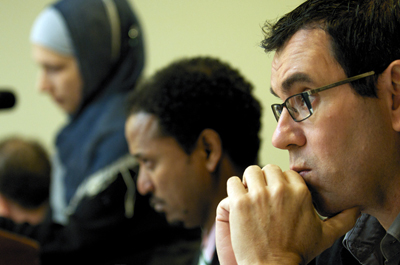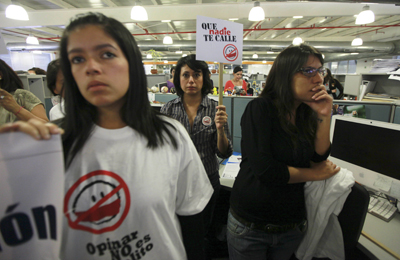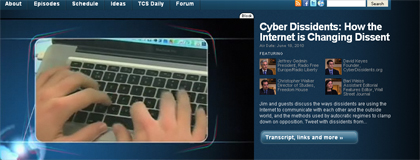Venezuela
2010
Internet Blotter
Venezuela prepares law to regulate media, including the Internet. Iranian blogger Hossein Derakhshan briefly released from jail on $1.5 million bail… …but fellow Iranian-Canadian anti-censorship software designer Saeed Malekpour still faces death penalty. Syrian telecom minister says awareness of the dangers, not censorship of the Internet is the solution.
Internet Blotter
Wikileaks hit by denial-of-service attack, turns to Amazon hosting… …but Amazon drops the site following pressure from a U.S. senator. Google extends its https encryption to YouTube, making video blocking harder. Censorship of the Net directly related to how authoritarian a regime is, claims a study. Venezuala’s telecom regulator proposes stronger takedown powers over Internet…

CPJ Press Freedom Awardee: ‘I always wanted answers’
The last few weeks have been extremely busy for everyone at CPJ as we’ve been preparing for the 2010 International Press Freedom Awards. Today’s press conference in Washington will be followed by a series of events culminating in our awards ceremony Tuesday in New York. As always, the awardees make it special.
Online freedom of expression in Latin America
On his blog, El Oso, David Sasaki has just finished up the third and last part in his series, “Internet Censorship and Freedom of Expression in Latin America.” It’s a brilliant overview of current political and social pressures on free speech and online reporting in the region. Some key observations: Direct governmental censorship in Latin…

Venezuelan censorship over morgue photos is selective
A controversial ruling by a Venezuelan court banning print media from publishing images of violence was partially reversed on Thursday following an international outcry from media, rights groups, and United Nations and Organization of American States officials.

As dissidents move online, governments fight back
Social media and cyber dissidents have exerted a increasing influence on global politics over the last few years—Twitter, for instance, was widely utilized by protesters and journalists during Iran’s 2009 post-election Green Movement, and China has been locked in conflict with Google over allegations of censorship and hacking. “Ideas in Action” with Jim Glassman, a half-hour weekly show on…
CPJ testimony: Press freedom in the Americas
CPJ Executive Director Joel Simon testified today before the U.S. House of Representatives’ Subcommittee on the Western Hemisphere, saying that while democracies are prevalent in Latin America, the press continues to operate with few institutional protections. This statement was submitted into the record on Monday.

‘Suddenly,’ Chávez is on the radio (yet again)
Venezuelan President Hugo Chávez Frías has used cadenas—nationwide radio and television addresses that preempt programming on all stations—to challenge the private media’s news coverage and amplify the government’s voice. In his radio and TV call-in program, “Aló, Presidente” (Hello, President), Chávez often lambastes critics in the media and the political opposition.